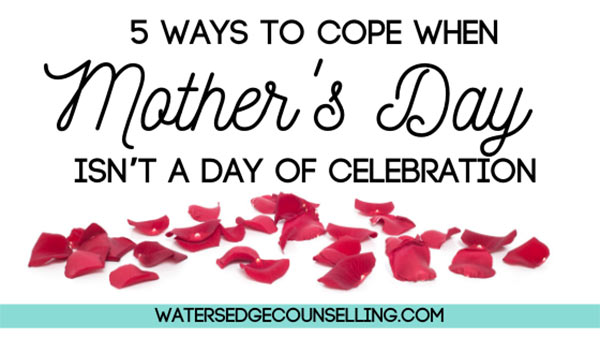
Mother’s Day 2020 is new for all of us. How do we celebrate our loved ones when we are all in isolation? It means that for many people, there will be a sense of grief or loss on the day because they can’t be with the ones they love.
While this is new for some people, others have a similar experience every Mother’s Day – and often every significant anniversary or holiday as well. The death of loved one, chronic or debilitating illness, childhood trauma or estranged relationships mean Mother’s Day can be a much tougher experience for you. So how can you get through the day? Depending on your situation, here are some ideas that might help.
If your mother or mother figure has passed away
If your bereavement is recent, it may feel unbearable to listen in on these conversations due to the overwhelming, yet often private pain you are experiencing. It is not easy to hold and contain your sadness when there are reminders everywhere; the supermarket, shopping centre, social media sites, television and billboards promoting the day with images designed to evoke powerful feelings of nostalgia and love. Even when significant time has elapsed, these reminders can evoke bittersweet memories that re-trigger the grief and sadness so that the rawness of your loss threatens to choke you all over again.
How you choose to enter into this day is a very personal choice—in fact, it may even be too painful to bring remembrance to the day. If you feel like that it is perfectly all right, however it is important to plan how you will spend the day for your own mental health and well-being.
Plan to spoil yourself a little and go for a walk in a park, by a river or the ocean; buy yourself some flowers; go for a drive; have a yummy lunch at some little café; walk around a nursery and purchase a plant. Do something that feels nurturing and relaxing.
If you choose to celebrate your mother there are many lovely ways to remember her. You might like to light a candle that burns throughout the day, write a letter to your mother telling her of your experience past and present to give expression to your own grief. You could visit your mother’s favourite places, spend time with your siblings and share some of your happiest memories, or go to a Mother’s Day service at your local church. You might even honour your mother’s memory by identifying someone who will alone on Mother’s Day and inviting them to share part of your day.
If your mother or mother figure is unwell, in hospital or in a nursing home
This can be a very challenging circumstance, in particular if your mother, in her own vulnerable state, is not highly responsive to your care. Reflecting upon the purpose of Mother’s Day and reframing it may be useful to your approach.
Whilst it is nice to receive expressions of thanks from our mother when we deliver our gift or do something special for her, it is likely that your mother has ‘gifted’ you in innumerable ways over your lifetime; the moment you were conceived your mother’s womb kept you safe and warm and her body nourished and grew you. Mum ‘patched you up’ when you fell over, fed you, tucked you in at night and ensured your safety and wellbeing in countless ways over your childhood.
Mother’s Day is as much about us as it is about our mother. It is an occasion to show our gratitude for those countless acts of giving. Even when our mother is not in a position to fully enjoy or appreciate our efforts to let her know she is loved; our act of giving is an expression of gratitude that grows the giver.
If your relationship with your mother has broken down, and you are unable to see her, or are sure it will result in conflict
Sometimes a relationship breakdown feels much like a death and special days like this will bring these feelings to the surface again. If this is your experience, be kind to yourself and plan to do what feels best for you.
Where visits with your mother have not been pleasant it is important that you consider how you can look after yourself in and around the encounter. You might invite your mother to meet at a local café, garden place or other location that feels neutral and creates a pleasant distraction. Keep your visit within a manageable time frame and plan what you will talk about. If there are certain conversations that trigger conflict, think about how you can redirect the conversation should it occur. You might distract your mother by reminding her of a pleasant childhood experience or redirect her attention to your surroundings.
If my relationship with my child/children is troubled
Being a mother is a privilege, bringing both pleasure and pain. When that connection is troubled it brings deep emotional pain, particularly if your children have cut off contact or make little effort to acknowledge you. If this is your experience, plan to do something that brings you pleasure; you might choose to write a caring letter to your child or even send them flowers! Reconciliation begins with me, so if it feels like you might be ready to extend the olive branch, this might be your opportunity.
Are you grieving a relationship with your mother? Do you struggle to celebrate Mother’s Day due to grief, estrangement, adoption, illness or infertility? Here’s what you need to do: Contact Colleen on 0434 337 245 or Duncan on 0434 331 243 for a FREE 10 minute consultation on how we can best help you or book online.
Leave a Reply